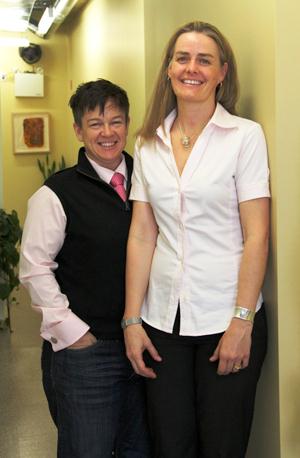The co-owner of a queer-identified business on Somerset St W says she’s giving up her walls to the area’s local arts festival, Chinatown Remixed, in order to give back to an inclusive community.
Other established neighbourhoods have a particular aesthetic that businesses need to adhere to, says Monique Andrews, of The Prana Group, a health clinic that bridges the gap between conventional and natural medicine.
“In certain neighbourhoods there’s a flavour of the day, you know. You go to Westboro and there are a million kid shops now,” she says. “But in Chinatown, there’s an inclusivity that authentically lets you be exactly who you are.”
During the festival, artists from across the city are hosted by participating Chinatown businesses. The format of the month-long festival is door-to-door, with guests going from business to business to view the art.
It was a day spent at Chinatown Remixed 2011 that encouraged Andrews and her partner to move their clinic to Chinatown last September after 10 years in the Glebe, she says, adding that the clinic’s lease was coming up for renewal anyway.
“We came, we spent the day and we loved it,” she says. “Being in the queer community, an inclusive environment, was certainly something I was looking for, and I think that Chinatown offers that.”
Don Kwan, co-owner of Shanghai Restaurant and one of the festival’s organizers, agrees that both the area and the festival are inclusive. Chinatown is a vibrant, diverse and ever-changing community, says Kwan, who was born and raised in the neighbourhood.
Fostering connections between people from different cultures and backgrounds is one of the festival’s mandates, hence the word “remixed,” Kwan says. One of the ways organizers remix festival participants is by purposely matching businesses and artists from different backgrounds, he says.
“We feel we’re cultural architects in a way — building bridges between different cultures.”
Daniel Martelock, a participating artist paired with the Asian grocer Kowloon Market, says the festival’s model is different than that of other art shows he’s been in. The Chinatown Remixed model encourages community building, he says.
“It’s not just ‘Here’s a space, good luck,’” he says. “It’s ‘Here’s a space, go find it and meet the people.’”
But it’s not only artists and businesses who build bridges. Festival-goers also build community because of the door-to-door model, Martelock says.
“People are going into businesses they’ve never even heard of and might not have gone into on their own,” he says.
Martelock says he’s trying to foster community building with his contribution to this year’s festival. On opening day, he will be outside Kowloon Market with two blank canvasses – one for himself and one for public participation.
“I’ve always felt that everyone . . . organizers, business owners [and the] public have all been very supportive and welcoming of diversity,” she says.
“It’s wonderful to have The Prana Group’s support this year,” she adds. “Everyone is very excited to have another queer-identified business on Somerset.”
This is China Doll’s first year participating as a visual artist. In the past she has performed and been the event’s official emcee.
She says she will break out the very best for the occasion by displaying a selection of iconic China Doll costumes at Aline Hair Design. The get-ups will be head-to-toe: wigs, sunglasses, dresses, rings, heels and other girly things.
She will also be at her venue on the opening day of Chinatown Remixed to give out oversized, personalized fortunes from her fortune cookie purse.

 Why you can trust Xtra
Why you can trust Xtra


